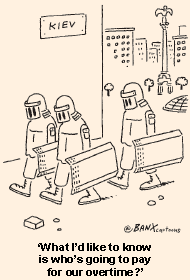Turkey: A pirates’ bazaar of bootleg tapes

Roula Khalaf, Editor of the FT, selects her favourite stories in this weekly newsletter.
When I arrived in Istanbul two and a half years ago, several contacts were reluctant to speak openly on the phone, fearful that such conversations were being bugged.
It would be nice to say their concerns were unwarranted, the product of a political culture eager to see conspiracies where the likes of me suspected cock-ups. But it turns out the fears were richly deserved. Someone – or a lot of someones – appears to be compiling a surreptitious oral history of Turkish society, starting with the very top.
Bugged recordings of some of the most prominent people in national life are appearing almost every day, although coverage in the Turkish media rather depends on the political loyalties of the outlet in question.
Recep Tayyip Erdogan, prime minister for more than a decade, said this month that “everybody” in Turkey had been wiretapped – he himself, President Abdullah Gul, executives and journalists – for purposes of blackmail. Rather endearingly, Mr Erdogan uses 1980s terminology to refer to such recordings, calling them “cassettes”. But the recordings are available on the internet and are notified to the world via Twitter.
They cast a striking picture of the prime minister and his business and political allies: in several recordings Mr Erdogan appears to instruct a friendly media executive on how the news should be presented (less coverage of the opposition is the basic message). Others appear to be cuttings from an anti-corruption probe of government-connected figures that Mr Erdogan’s administration has in effect halted. (All those concerned protest their innocence; while some say the tapes have been manipulated, the prime minister says the recordings have invaded his privacy.)
Tapes have also surfaced of Mr Erdogan’s current arch-enemy, an Islamic preacher called Fethullah Gulen, talking to lieutenants in business and the media. The leaks are part of a war between Mr Erdogan and Mr Gulen’s movement, which has adherents across Turkish society and in key institutions.
On Monday a government-affiliated newspaper published the names of about 7,000 people – including government officials and media figures – whose phones it says were tapped at the request of Gulenist prosecutors. Meanwhile, Gulenists say that new government proposals to boost the powers of Turkey’s intelligence agency – and facilitate wiretaps – will turn Turkey into a surveillance state.
Altered state

Police used tear gas on protesters near Istanbul’s central Taksim square at the weekend but after months of such clashes no one was surprised. The government shifted hundreds of police officers last week in its response to the corruption probe – which it denounces as a Gulenist-led conspiracy – but after the relocation of thousands of others this too has become standard.
This is the picture Turkey too often presents today – less a country of rules and institutions, more one where political loyalties descend into almost every corner of national life.
Even the business world’s three main groupings – groups known as Tusiad, Musiad and Tuskon – are seen as closer, respectively, to the country’s old secularist elite, Mr Erdogan’s Islamist-rooted AK party and Mr Gulen’s movement. Each world view now has its own English-language newspaper – a sign of the battle for international opinion. It is not quite a Hobbesian war of all against all but executives of all stripes privately complain of partisan acts against them.
Tusiad’s head said in a speech that foreign investment would not come to a country where companies were pressurised by tax fines and the tender law was changed repeatedly. Mr Erdogan labelled him a traitor and warned the group: “Your books and your taxes will be inspected, just like a grocery store’s.”
Divine clarity
A mischievous divinity laid on fog for Istanbul last week. The mist swirled across the Bosphorus, obscuring the sight of Asia from the coast of Europe, although in some places the continents are less than 1km apart. Aircraft were grounded, normally hyperactive little commuter boats kept at the shore.
It seemed a rather pointed reference to the state of Turkish politics, which also sometimes seems afflicted by impenetrable haze, although there are moments of striking visibility even as the storm clouds gather.
Twitter: @danieldombey
Comments